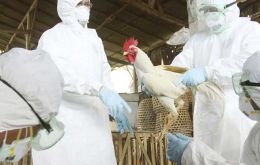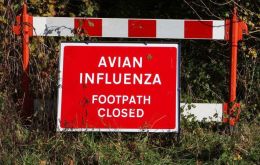MercoPress. South Atlantic News Agency
Tag: H5N1
-
Monday, June 2nd 2025 - 08:54 UTC
Uruguayan authorities warn of dangers of avian influenza

Uruguay's Public Health Ministry (MSP) issued Sunday a series of recommendations to keep avian influenza from spreading to humans.
-
Tuesday, January 28th 2025 - 08:06 UTC
Avian Influenza Prevention Zone extended to all of England; H5N1 human case in West Midlands

The UK Health Security Agency, UKHSA, has confirmed a case of influenza A(H5N1) in a person in the West Midlands region. Simultaneously the UK Chief Veterinary Officer has ordered a new Avian Influenza Prevention Zone AIPZ to cover the whole of England from noon on Saturday 25 January following the escalating number of cases of avian influenza and continued heightened risk levels in wild birds.
-
Thursday, June 6th 2024 - 09:52 UTC
First human death due to avian flu reported

A 59-year-old man in Mexico was reported Wednesday to be the first person ever to die of avian flu A(H5N2), the World Health Organization (WHO) confirmed on its website about the patient who passed away on April 24. The source of exposure to the virus usually circulating in poultry remains unknown and the victim had no history of contact with these animals.
-
Thursday, November 9th 2023 - 09:34 UTC
Brazil: Bird flu emergency extended

Brazilian authorities Wednesday extended for 180 days a declaration of animal health emergency nationwide due to avian influenza, Agencia Brasil reported. The Ministry of Agriculture and Livestock adopted the measure due to the identification of outbreaks of the highly pathogenic H5N1 avian influenza virus, mainly in wild birds.
-
Saturday, February 25th 2023 - 09:13 UTC
WHO worried: human-to-human transmission of bird flu cannot be ruled out

World Health Organization (WHO) experts have expressed their concern after two cases of humans catching H5N1 avian flu were confirmed this week. During a virtual press conference Friday, WHO Director of Epidemic and Pandemic Preparedness and Prevention Sylvie Briand said the situation was “worrying.”
-
Friday, November 25th 2022 - 08:46 UTC
Peru declares avian influenza health alert

Peruvian health authorities have launched a health alert for 180 days after three cases of the highly contagious H5N1 avian influenza were detected in pelicans, it was announced Thursday in Lima.
-
Friday, January 7th 2022 - 20:49 UTC
First fatal victim of bird flu reported in UK

British health authorities Friday reported what seems to be the first fatal case in humans of the H5N1 variant of bird flu, which rarely infects humans, but when it does, it has a mortality rate of about 60%.
-
Monday, February 3rd 2020 - 07:20 UTC
China reports outbreak of H5N1 bird flu in poultry farm with 7.850 chickens

China reported an outbreak of a highly pathogenic strain of H5N1 bird flu at a farm in Shaoyang city of the southern province of Hunan, the Ministry of Agriculture and Rural Affairs said on Sunday.
-
Friday, April 26th 2013 - 14:39 UTC
Chinese scientists confirm new bird flu strain jumped from chickens to humans

Chinese scientists have confirmed for the first time that a new strain of bird flu that has killed 23 people in China has been transmitted to humans from chickens. In a study published online in the Lancet medical journal, the scientists echoed previous statements from the World Health Organization (WHO) and Chinese officials that there is as yet no evidence of human-to-human transmission of this virus.
-
Wednesday, April 24th 2013 - 23:40 UTC
New bird flu strain in China “one of the most lethal” warns WHO

A new bird flu strain that has killed 22 people in China is “one of the most lethal” of its kind and transmits more easily to humans than another strain that has killed hundreds since 2003, a World Health Organization (WHO) expert said on Wednesday.
